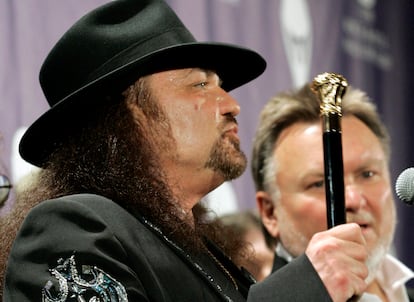Lynyrd Skynyrd founding member Gary Rossington dead at 71
He had cheated death more than once: he survived a car accident in 1976. A year later, he survived a plane crash that killed singer Ronnie Van Zant, guitarist Steve Gaines, and backing vocalist Cassie Gaines

Gary Rossington, Lynyrd Skynyrd’s last surviving original member who also helped to found the group, died Sunday at the age of 71. No cause of death was given.
“It is with our deepest sympathy and sadness that we have to advise, that we lost our brother, friend, family member, songwriter and guitarist, Gary Rossington, today,” the band wrote on Facebook. “Gary is now with his Skynyrd brothers and family in heaven and playing it pretty, like he always does. Please keep Dale, Mary, Annie and the entire Rossington family in your prayers and respect the family’s privacy at this difficult time.”
Rossington cheated death more than once, Rolling Stone magazine reported. He survived a car accident in 1976 in which he drove his Ford Torino into a tree, inspiring the band’s cautionary song “That Smell.” A year later, he emerged from the 1977 plane crash that killed singer Ronnie Van Zant, guitarist Steve Gaines, and backing vocalist Cassie Gaines, with two broken arms, a broken leg, and a punctured stomach and liver.
“It was a devastating thing,” he told Rolling Stone in 2006. “You can’t just talk about it real casual and not have feelings about it.”
In later years, Rossington underwent quintuple bypass surgery in 2003, suffered a heart attack in 2015, and had numerous subsequent heart surgeries, most recently leaving Lynyrd Skynyrd in July 2021 to recover from another procedure. At recent shows, Rossington would perform portions of the concert and sometimes sat out full gigs.
Rossington was born Dec. 4, 1951, in Jacksonville, Florida, and raised by his mother after his father died. Upon meeting drummer Bob Burns and bassist Larry Junstrom, Rossington and his new friends formed a band, which they tried to juggle amid their love of baseball.
According to Rolling Stone, it was during a fateful Little League game, Ronnie Van Zant hit a line drive into the shoulder blades of opposing player Bob Burns and met his future bandmates. Rossington, Burns, Van Zant, and guitarist Allen Collins gathered that afternoon at Burns’ Jacksonville home to jam the Rolling Stone’s “Time Is on My Side.”
Adopting Lynyrd Skynyrd as the group’s name — both a reference to a similarly named sports coach at Rossington’s high school and to a character in the 1963 novelty hit “Hello Muddah, Hello Fadduh” — the band released their debut album (Pronounced ‘Lĕh-’nérd ‘Skin-’nérd) in 1973. A collection of country-tinged blues-rock and Southern soul, the album included now-classics like “Tuesday’s Gone,” “Simple Man” and “Gimme Three Steps,” but it was the closing track, the nearly 10-minute “Free Bird,” that became the group’s calling card, due in no small part to Rossington’s evocative slide playing on his Gibson SG.
Rossington told Rolling Stone that he never considered Skynyrd to be a tragic band, despite all the band’s drama and death. “I don’t think of it as tragedy — I think of it as life,” he said upon the group’s Rock & Roll Hall of Fame induction in 2006. “I think the good outweighs the bad.”
Sign up for our weekly newsletter to get more English-language news coverage from EL PAÍS USA Edition
Tu suscripción se está usando en otro dispositivo
¿Quieres añadir otro usuario a tu suscripción?
Si continúas leyendo en este dispositivo, no se podrá leer en el otro.
FlechaTu suscripción se está usando en otro dispositivo y solo puedes acceder a EL PAÍS desde un dispositivo a la vez.
Si quieres compartir tu cuenta, cambia tu suscripción a la modalidad Premium, así podrás añadir otro usuario. Cada uno accederá con su propia cuenta de email, lo que os permitirá personalizar vuestra experiencia en EL PAÍS.
¿Tienes una suscripción de empresa? Accede aquí para contratar más cuentas.
En el caso de no saber quién está usando tu cuenta, te recomendamos cambiar tu contraseña aquí.
Si decides continuar compartiendo tu cuenta, este mensaje se mostrará en tu dispositivo y en el de la otra persona que está usando tu cuenta de forma indefinida, afectando a tu experiencia de lectura. Puedes consultar aquí los términos y condiciones de la suscripción digital.








































